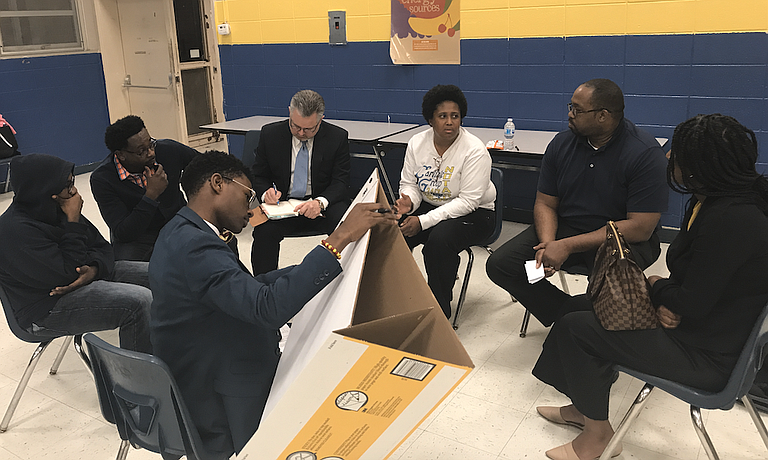Young people in Jackson, through the Mississippi Youth Media Project and the Kappa League, are convening a series of dialogues about youth crime. Here, Jim Hill High School student Ruben Banks leads a break-out discussion about building respect between law enforcement and young people at Wingfield High School. Mississippi FBI Special Agent in Charge Christopher Freeze (in coat and tie) was his co-moderator. The next youth-crime dialogue is Thursday, March 22, from 6 to 8 p.m. at Jim Hill High School. The public is welcome. Photo by Donna Ladd.
Wednesday, March 7, 2018
The Parkland, Fla., teenagers who became activists against gun violence while locked in closets on Valentine's Day are giving many of us life during a dark period in our country.
I'm following every Stoneman Douglas High School student on Twitter as I run across them, and I cheer at their fortitude that so many adults cannot muster to stand up for what's right and against what's so clearly wrong, such as proliferating assault-style guns that rip children's bodies apart. They counter the timidity that is so rampant here in Mississippi—with many progressive thinkers refusing to speak up, offend a frat brother or lose financial support from a buddy over political disagreement.
I've been told many times, often by Democrats who really wish I'd toe their every line, to shut up and be more polite even as I'm a woman who expresses informed opinions in my home state and in a newspaper I own. Too often to count I've been ordered to focus on one or another issue and not another I feel passionately about.
Insipid gentility doesn't serve any of us. I probably don't have to point out that Dems haven't won much statewide lately after all the years of equivocating to conservative ideals and politicians, including sometimes using—or pulling punches on—anti-immigrant, homophobic, sexist and racist and NRA-approved "tough-on-crime" rhetoric. I've even been instructed to not talk about what the Confederate emblem in the state flag actually stands for—a war to maintain and extend slavery. (Many prefer to say the KKK later co-opted it.)
Fearful adults, while often well-meaning, turn off potential new voters, often limiting the voting appeal to fully funding public education—which I want, no doubt, and we've done the deepest reporting on it (also here)—and maybe funding roads and bridges. I exaggerate, but not by much.
I'm fully with the Parkland teenagers who are willing to loudly question anything they believe needs to be changed. They are calling out the charlatans and the hypocrites. They are identifying the various and assorted naked emperors in the room. They don't fear the inevitable trolls, scolds and finger-waggers who say they are too rude, vulgar or whatever. You might say they have less to lose than adults who need to maintain their wealth and jobs, or whatever, but they don't. Teenagers are on the front lines of gun violence in America. I'm fine with them tossing an F-bomb at the NRA.
But young Parklanders are not only being loud and in the faces of those who have gotten a pass from adults for far too long. They are being quiet and listening, too, to others who have experiences they haven't had. And this is the part I admire the most because, you know, most adults aren't all that great at this part, either.
Never Back Down: Mississippi Escalates War on Gangs
A proposed gang bill was not based on current evidence-based violence research. It died in the Legislature.
I noticed it soon after the tragedy at their school. Some #neveragain students, white ones included, tweeted about race equity and unhealthy school discipline in their tweets. Yes, they were going to a public school in a wealthy suburb—with extracurricular and civic activities that taught them to be confident, informed debaters—but they weren't only interested in gun violence by and against white people.
This weekend, I saw a tweet with four pictures from the awe-inspiring Emma Gonzalez. She and other Parkland activists had gone to Chicago to meet with young people of color about the gun violence their community experiences and were sitting around a pool listening to each other.
"'Florida's safest city' and one of the cities in America most affected by gun violence came together to share stories, ideologies and pizza," Gonzalez tweeted. (She now has more Twitter followers than the NRA.)
This right here is what America needs and so often lacks: people crossing lines and listening and learning from each other, then working together to solve problems.
"Those who face gun violence on a level that we have only just glimpsed from our gated communities have never had their voices heard in their entire lives the way that we have in these few weeks alone," Gonzalez said in the tweet under it.
Then she wrote: "People of color in inner-cities and everywhere have been dealing with this for a despicably long time, and the media cycles just don't cover the violence the way they did here."
All victims of gun violence, Gonzalez added, must make the change together.
Imagine this kind of conversation here in our state. I work with teenagers in the Mississippi Youth Media Project (jxnpulse.com) who are trying to jumpstart such dialogues, but the wealthier kids (or adults) don't always show up for shared conversations, including one held at a private academy here recently. Maybe they're fearful; maybe they're busy; maybe both.
The JFP's 'Preventing Violence' Series
A full archive of the JFP's "Preventing Violence" series, supported by grants from the Solutions Journalism Network. Photo of Zeakyy Harrington by Imani Khayyam.
Bad policies result when these shared discussions do not happen. Yes, we dodged the bullet, so to speak, on the awful gang bill (that would have targeted lower-income residents with no assistance or rehab baked in) before the Legislature. But right here in "radical" Jackson, police are part of a federal "Project Eject" effort that sends those arrested across the country to federal prisons, far from family and any sense of stability.
I thought of "Project Eject" last night when I attended a Koch Industries-funded talk in favor of criminal-justice reform and re-entry programs to help those returning from prison became productive citizens and workers again. The speaker, John Koufos, was a New Jersey felon who went to prison for driving drunk and seriously injuring a teenager. He now advocates for intelligent criminal policy instead of all the tough-on-crime junk many candidates run on.
During the Q-and-A at the Old Capitol Inn, Koufos mentioned federal arrests that send prisoners far from home. "Many times ... you've got people locked up all over the country. How are you supposed to re-integrate these folks back into the community when they're in Kansas?" Koufos, the national director of reentry initiatives for Right on Crime, said to the room packed with mostly conservative white men.
I'm glad I showed up and listened to people I'm supposed to disagree with constantly. Public safety isn't about red-blue gamesmanship and staying in one's perceived lane. We don't have to agree on everything to listen and speak up. As Gonzalez tweeted, "hand in hand, side by side, We Will Make This Change Together."
All are welcome at a Youth Media Project Youth Crime Dialogue at Jim Hill High School on March 22 from 6 p.m. to 8 p.m.




Comments
Use the comment form below to begin a discussion about this content.
Sign in to comment
Or login with:
OpenID